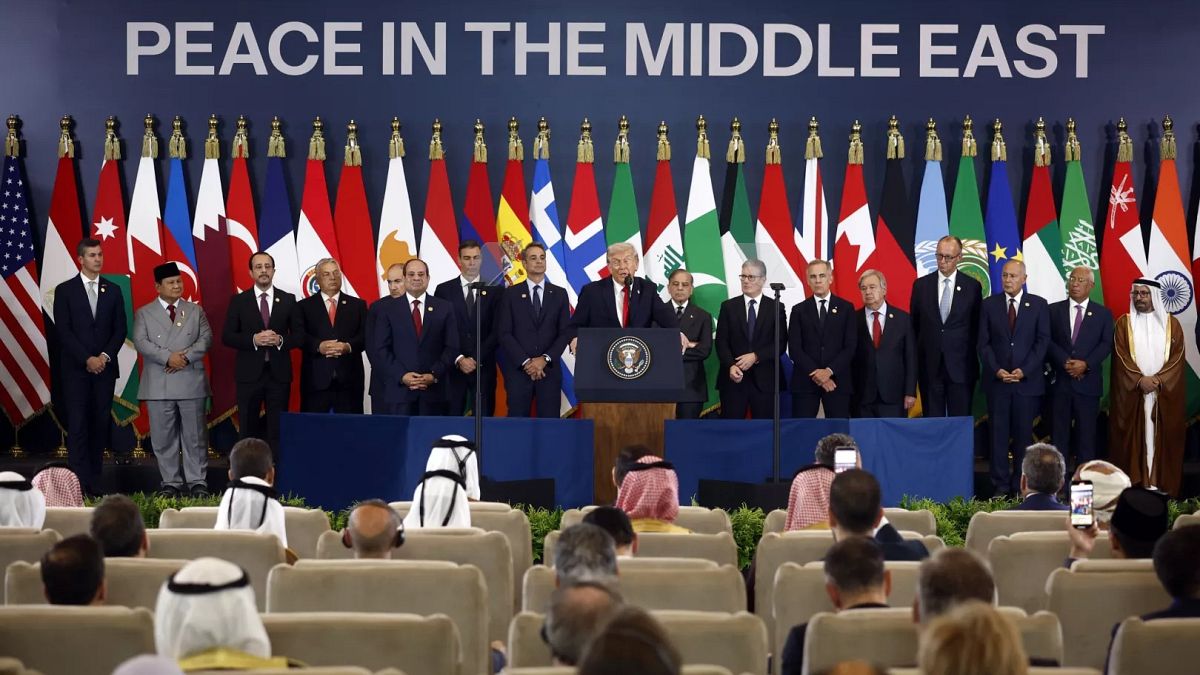EU Commission President Ursula von der Leyen on Monday voiced the EU’s full support for the Gaza peace plan “brokered by the United States, Qatar, Egypt and Turkey.”
“We stand ready to contribute to its success with all tools at our disposal,” she wrote on X. “And we will provide EU funding for the reconstruction of Gaza.”
In addition, Brussels will restart a civilian mission to monitor the Rafah border crossing between Gaza and Egypt on Wednesday in support of the ceasefire deal, the EU’s foreign policy chief, Kaja Kallas, said in a separate statement.
For two years, internal divisions have paralysed the European Union in the Gaza conflict.
EU responses have been limited to “deep concern” and diplomatic hedging, a situation that prompted Israeli Prime Minister Benjamin Netanyahu to say that Europe had become irrelevant.
But now, with the first phase of US President Donald Trump’s peace plan, the release of the hostages and Palestinian prisoners, achieved, the EU hopes to play an essential role in ensuring all phases of the plan are implemented or, in Netanyahu’s words, become relevant again.
Because now comes the hard part.
Phase two of the plan envisions the creation of a new governing body in Gaza, excluding Hamas, the deployment of a multinational force and the disarmament of Hamas.
Whether this will play out as stipulated in the peace plan, is hard to predict.
“Even under the most optimistic scenarios, we will not be looking at peace,” writes Richard Haass, president emeritus at the Council on Foreign Relations in New York.
“Hamas can be denied a formal role in Palestinian governance but it will still have influence, possible more than any other actor.”
Therefore it is crucial that the people in Gaza see quick improvements of their situation: food, water, medical support, housing and other essentials need to be provided as soon as possible.
With much of the Gaza infrastructure destroyed, experts predict that the territory faces a recovery that could take decades and cost billions of dollars.
In February, a report by the EU, the World Bank and the United Nations painted a grim picture, with estimated costs of $53 billion (€45 billion) and with short-term needs in the first three years to be around $20 billion (€17 billion).
And here is where Europe can help.
“Now is the time for the bloc to line up its ability to use its leverage,” writes Rym Montaz from the think tank Carnegie Europe.
“This would maximise Europeans’ ability to contribute to shaping the end of the deadliest and most politically destabilising war in their southern neighborhood.”
Europe is not powerless. “It should immediately launch a dedicated recovery and resilience fund,: says Liel Maghen, Policy Associate at the Mitvin Institute, an Israeli think tank.
“By embedding this fund within the broader reconstruction and state-building framework proposed by the Egyptian government and the Palestinian Authority, the EU can help channel aid toward genuine, bottom-up capacity building.”
In a speech before the UN General Assembly last month, Ursula von der Leyen announced plans to create a special group of donors to coordinate and fund the large-scale reconstruction of Gaza.
The idea is to bring together international charitable efforts into a single instrument that will ensure transparent governance of funds and efficient use of resources for rebuilding the region.
If European money can help bring about a lasting peace in the Middle East, the bloc will become an important player in the region.
But there is a different scenario that is also possible.
The Trump plan stipulates that Gaza will be governed under the temporary transitional governance of a “technocratic, apolitical” committee made up of “qualified Palestinian and international experts.”
Oversight and supervision will lie with a transitional body, the “Board of Peace,” which will be headed by Trump, with other members to be announced.
The former British Prime Minister Tony Blair is reportedly among them.
No EU leaders are mentioned in the plan and it is not clear whether any EU figures would join the board in the future.
In addition, under the stewardship of the United States, a temporary International Stabilisation Force (ISF) will be developed and immediately deployed in Gaza.
The US will reportedly not provide military personnel, but other countries have been mentioned as part of the ISF: Egypt, Qatar, Turkey, to name the most important.
Again, European nations are not in the picture – for now. This is important, as whoever has boots on the ground, will potentially have a bigger say politically.
It is too early to tell how big Europe’s influence in the future Middle East will eventually be and whether the bloc will be able to overcome the deep divisions that have shaped its diplomacy in the region.
And whether money alone will make a difference.

